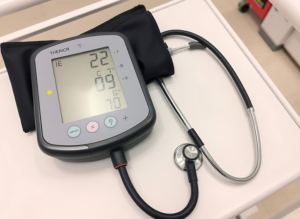Colon cancer is considered the third most common cancer in the world, with thousands of patients being diagnosed every year. Most treatment options have better chances of success and pelvic cancer survival rates are higher if the disease is detected early. But how do we catch this silent intruder before it doesn’t cause too much damage?
Many people might be unaware that ultrasound, an examination commonly used in diagnosing pregnancy or organ diseases, can also be used to identify the presence of colon cancer in the body.
There has been a marked interest in the utility of this modern imaging modality in the evaluation of lesions within the colon. Thus, what exactly does ultrasound bring to the table, when aimed at molecules for such an aggressive disease?
Your health is the most important thing at the end of the day, and knowing these kinds of techniques will make you healthier as they enable you to take control of your health.

The Importance of Early Detection in Colon Cancer
As with every disease, learning of colon cancer in its early stages should be the goal. Colon cancer stage 1 is the initial stage of the cancer in which the features of the disease are normally limited to the inner layer of the colon. As a result of this recognition, there are much higher rates of cure. This is largely on account of less volume of the tumor and lower disease dissemination in the body.
Therefore, by the time observers and patients notice the symptoms, the condition has often progressed to more advanced stages. But routine exams also play a vital role as they prevent the development of serious conditions from mild abnormalities.
Moreover, for colon cancer patients, a number of alternatives are available in the advanced stages. A qualified clinician may recommend minimally invasive approaches or cumulatively address targeted therapies that can improve the post-treatment patient’s quality of life.
Education of the general population about screening guidelines is important. For example, the general population should seek regular check-ups starting at age 45 or even younger if there is a familial history of the disease. Such responsible measures taken by the individuals enable them to get the better of this stealthy fight against colon cancer.
What is Ultrasound and How Does it Work?
Ultrasound is a type of medical imaging that employs high-frequency sound waves to produce pictures from within the body. It’s non-invasive and does not require radiation, making it a safe option for most patients.
The circulation of events begins with a transducer that is responsible for furnishing sound waves of high frequency. When these sound waves resonate with various tissues of the body, they reflect back to the transducer. The echoing of sound results in the regaining of images that are processed and displayed on the screen.
Ultrasound is generally used for visualizing structures such as organs and blood vessels and is able to penetrate through soft tissues. In the examination of the colon, ultrasound assists in the detection and localization of defects or masses in the lumen of the colon by transforming the examination into video images.
To maintain good contact between the transducer and the patient’s skin, the patients are asked to lie down as the gel is slathered on their abdomens. Usually, the whole procedure lasts for no more than an hour and helps the specialists inspect foreseen problems with no pain to the patients.
Types of Ultrasound Used for Detecting Colon Cancer
Abdominal ultrasound is one of the US types available and is frequently employed in cancer detection. It produces cross-sectional images of the internal organs to help assess their structure for any abnormalities or masses including cancer.
Transrectal ultrasound TRUS is another approach that employs ultrasound in colon cancer detection. In this approach, a small probe is inserted into the rectum for better visualization of the rectum and lower approaches of the colon.
TRUS is utilized for targeting tumors that may otherwise be undetected using standard imaging modalities.
A third method regards endoscopic ultrasound EUS which means that an endoscope and ultrasound technologies are combined together providing enhanced visualization of the inner intestinal wall and adjacent tissues around it. EUS is ideal for assessing stage progression in pre-existing CRCs.
All the above types have their specific advantages hence there is a need for the healthcare givers to select the most appropriate based on any given situation of the patient.
Accuracy and Effectiveness of Ultrasound in Detecting Colon Cancer
Both medical professionals and patients often commend ultrasound because it does not require surgical procedures and can take images of internal structures. But in the case of colon cancer specifically, this can be rather hit or miss.
The current ultrasound technology’s success rate in tumor diagnosis tends to be dependent on the size and position of the tumor. It is reasonable to assume that a bigger tumor would be easier to see than a smaller tumor. This complicates the ultrasound image interpretation when speaking of early carcinomas.
Moreover, the presence of air in the intestines may act as a barrier to the sound waves, rendering the diagnosis to be missed or recorded as negative. Albeit a pertinent diagnostic tool in some cases, it would be impractical to lead purely on ultrasound.
This weakness is supported by the juxtaposition of other measures. Techniques such as colonoscopy have been shown in practice to be the most sensitive and specific in the diagnosis of colon cancer. When determining disease risk factors and signs, the evaluation of the colon needs to take into account more than one measure.
Other Screening Methods for Colon Cancer
In regard to the search for colon cancer in its early stages, there also are other methods of screening for cancer. Each of them has its strengths and limitations.
Colonoscopy is among the procedures that follow the most recommendations. It allows the imaging of the entire colon and also removes polyps in the course of the procedure. Thus, this approach not only diagnoses but also treats the problems at hand.
Fecal immunochemical tests (FIT) provide a non-invasive method to alternative interventional measures. These tests look for traces of blood in the fecal matter that might indicate some level of abnormal presence without going through lots of drills and even sedation.
CT colonography is a procedure that is also referred to as virtual colonoscopy. It employs devices to take pictures of the colon. Less preparation is required compared to a traditional colon scope but there is a need for a clean bowel.
Flexible sigmoidoscopy evaluates only a sector of the colon but is reasonable in the detection of certain types of cancers in that region. Each method of screening has its strengths and weaknesses however they all aid in the maintenance of health in one way or another.
Benefits and Limitations of Using Ultrasound for Colon Cancer Detection
Colon cancer detection with ultrasound has several advantages. Its non-invasive and painless techniques, provide the patient with a very good option. In this case, sound waves are utilized to transmit pictures of the organs, which can assist in spotting some irregularities while conducting the surgery.
Moreover, the use of ultrasound does not expose the patient to radiation which eliminates the risks that come with other imaging options. It is also fairly quick and can be done in an outpatient clinic.
Nonetheless, there are some shortcomings that should be noted. Ultrasound tends to be less detailed than CT or MRI scans which increases the chances of missing the detections. It may vary in effectiveness depending on the patient’s shape and how prepared the bowel is.
Furthermore, although it can depict masses or inline lesions around the colon, it may have problems visualizing lesions underneath which would need more sensitive imaging modalities. It is necessary to appreciate these aspects when assessing the screening methods for colon cancer.
Making Informed Decisions About Colon Cancer Screening
As for the screening for colon cancer in particular, the important thing is to be well informed. This involves knowledge of the different possibilities within the scope that includes ultrasound, thus making better health choices. Fighting the disease depends on how early it is detected, for it is a great determinant of the treatment’s success.
By discussing with medical staff, you can be helped in selecting the appropriate screening that is personalized to your history and current health status. Whichever option you choose for screening, be it ultrasound or another method, taking the initiative to avail of such services is sufficient progress.



